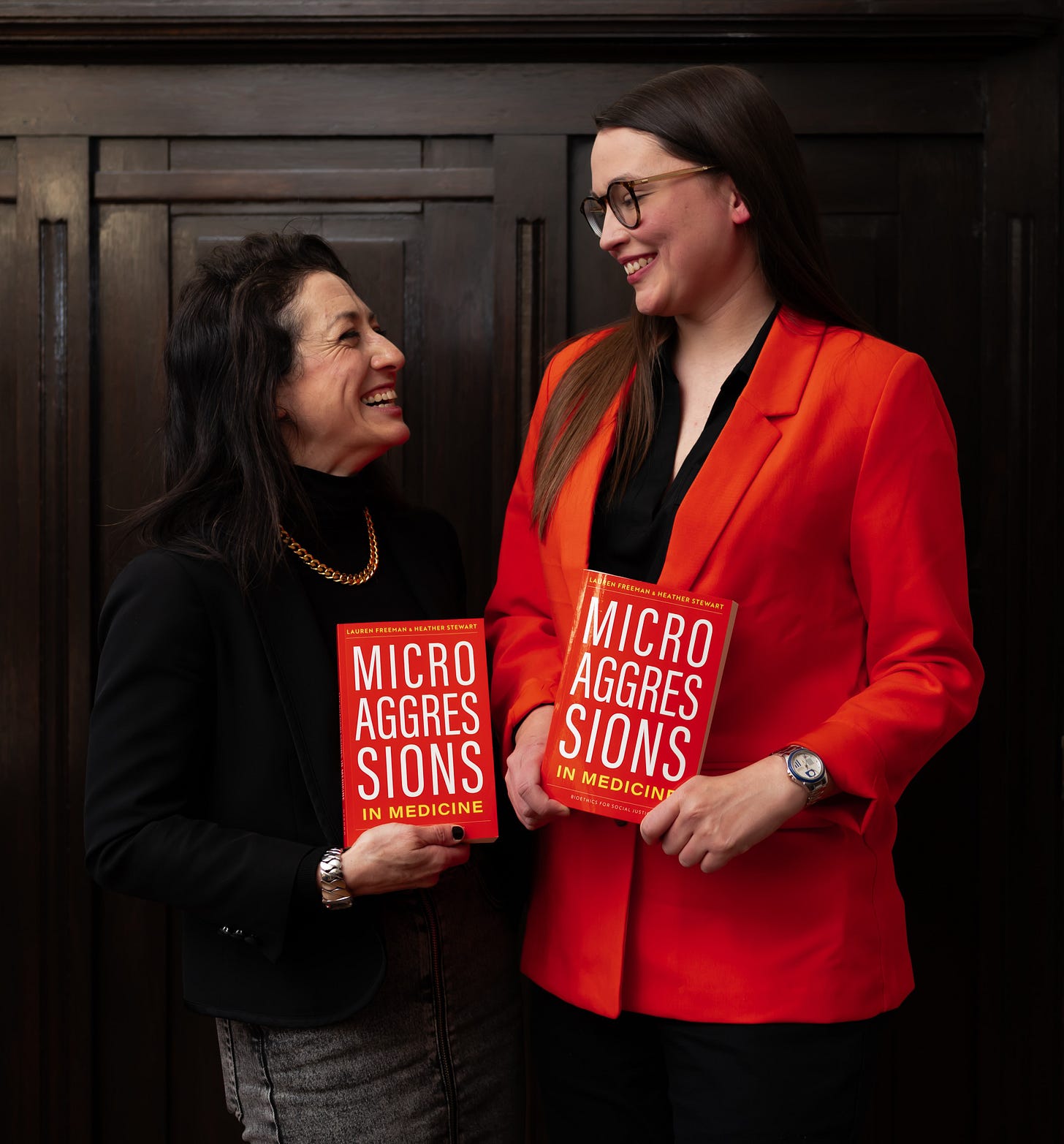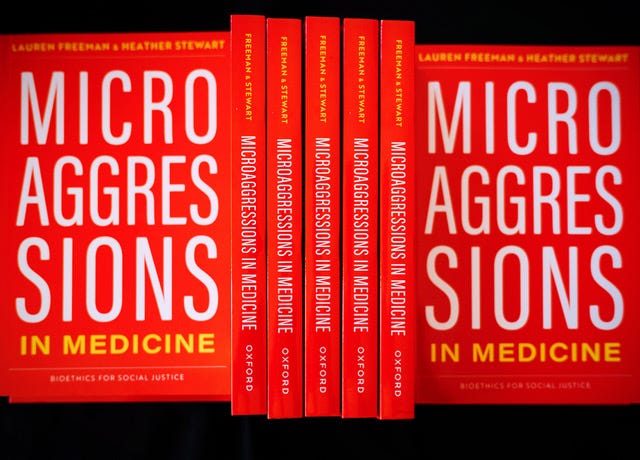Heather Stewart (Oklahoma State University) and Lauren Freeman (University of Louisville), "Microaggressions in Medicine"
Oxford University Press, 2024
By Heather Stewart and Lauren Freeman
If anything, the COVI9-19 pandemic laid bare in rather striking ways how grossly unequal and inequitable healthcare opportunities and outcomes are for patents who are members of marginalized groups. Moreover, recent legislative attacks on the healthcare needs of women and pregnant people in the form of restrictive abortion bans, and on trans and non-binary people in the form of bans on gender affirming care make clear that there are very real, active, and explicit assaults on the healthcare needs of already vulnerable patient groups. Much of the current legislation and healthcare policy are forms of overt and explicit discrimination, which have obvious impacts on the kinds of healthcare people do or do not have access to; the quality of care they receive; and ultimately, on the health and wellbeing that they can or cannot achieve.
For obvious reasons, overt and explicit medical discrimination is important to recognize and resist. However, such discrimination is only part of the story when it comes to worse health and healthcare outcomes experienced by marginalized patients. Even if we eliminated such discriminatory legislation and policy, and ensured that all patients – regardless of race, gender, socioeconomic status, disability, or body size – had access to all of the healthcare they needed, inequities would nevertheless persist. One reason for this is explored in our recently published book, Microaggressions in Medicine (OUP 2024). There, we argue that well-intentioned healthcare professionals are actively contributing to these problems by causing harm to patients in subtle ways, often without even knowing it.
Our book develops a novel account of microaggressions and illuminates their moral significance, particularly in healthcare contexts. Microaggressions are comments, actions, bodily gestures, or even features of physical spaces which subtly and often unintentionally communicate bias or hostility toward members of marginalized groups. They are particularly pernicious forms of discrimination because they are frequent and subtle, and therefore often disregarded as insignificant, or altogether ignored. From the perspective of those on the receiving end, however, microaggressions can be incredibly harmful, especially as their effects compound over time. In light of this, in our book we develop what we call a harm-based account of microaggressions, which understands and categorizes microaggressions on the basis of the kinds of harms they lead to for those on the receiving end. On our account, there are three types of microaggressions. Epistemic microaggressions result in epistemic harms, emotional microaggressions result in emotional harms, and self-identity microaggressions result in harms to one’s identity or sense of self. We examine the various short- and long- term consequences of microaggressions that occur for marginalized patients in medical contexts, arguing that microaggressions play a significant role in clinical encounters, and can have detrimental effects on healthcare delivery and health outcomes.
Consider an example. A trans masculine patient enters a clinic and, despite patient intake forms that do not have a designated space to indicate your gender, pronouns, and affirmed name, he writes them down clearly anyway: Evan (he/him). Despite indicating his name and pronouns, the nurse that calls Evan in for his appointment uses his deadname (the name he was given at birth and that is on his medical records), and everyone he encounters addresses him with feminine identifiers such as “ma’am” or “Miss.” Evan feels embarrassed at first, and then increasingly frustrated, bordering on angry, and afraid. He certainly doesn’t feel comfortable openly discussing aspects of his care that relate to him being trans.
The deadnaming and misgendering Evan experiences are examples of what we call self-identity microaggressions, which occur when healthcare providers (or others) either intentionally or unintentionally undermine or fail to recognize and respect the marginalized identities of patients and the realities of their lived experiences as people with those identities or who are embodied in non-normative ways (such as on the basis of being trans or non-binary, or on the basis of so-called non-normative body size). Though often subtle (from the perspective of the people committing them), self-identity microaggressions treat patients as less than fully human and are thus not micro from the perspectives of those on the receiving ends. As a result of experiencing self-identity microaggressions, recipients might come to question their status as persons worthy of dignity and respect, which can result in harm to their health and general well-being.
In this sort of case – and in others like it – the healthcare professionals who deadname and misgender Evan are likely well-intentioned: they do not intend or desire to cause him, or any of their patients, any harm. They likely don’t even realize what they’ve done, or how it impacts Evan. They might not even realize that for Evan, who was already feeling vulnerable, it was particularly important to use extra care to get things right. This is all fairly reasonable: the healthcare professionals in the clinic see many patients per day, are under stressful time constraints and other institutional pressures, and are simply trying to do their jobs and to get patients in and out.
However, when we consider things from Evan’s perspective, we can see that being deadnamed and misgendered are quite harmful. First, this was not just a one-off mistake. Rather, being deadnamed and misgendered is part of an invalidating pattern that occurs with regularity. Insofar as this is the case, each time it happens, it chips away at his confidence, his comfort, and his sense of himself. Such microaggressions undermine who he is and how he wants to be perceived and treated in the world. They are harmful whenever and wherever they happen, but in medical settings, the stakes are much higher.
Quality healthcare relies on trust and effective communication. In cases like Evan’s, it can become increasingly difficult for patients to trust that those tasked with their care are in a position to really listen to them, to see and understand them for who they are, and to take extra care to treat them with the respect and recognition that all patients deserve. When trust is damaged, the ability and willingness to openly and effectively communicate is threatened. Marginalized patients might not feel safe or comfortable being open and honest, let alone vulnerable, with healthcare providers who they can’t fully trust. And when communication is threatened, so is the ability to accurately diagnose and treat illness or to otherwise provide quality care. Considered in this light, microaggressions are worthy of our attention in our efforts to promote health justice. Recognizing and reducing microaggressions is a key part of cultivating healthcare environments that are equitable, fair, and inclusive for all patients and of ensuring that all patients receive the high-quality care that they deserve.
Microaggressions in Medicine is the first and right now, the only book to examine microaggressions and their harms in medical contexts. It sketches a history of the concept of microaggressions and surveys developments in microaggression research in psychology, philosophy, and in other related fields. It critiques the standard way of theorizing and categorizing microaggressions and develops a novel account, which is then applied to medical contexts by analyzing diverse patient testimonies and medical case studies Finally, the book offers practical strategies to healthcare professionals for minimizing microaggressions in medical practice. In covering this vast terrain, Microaggressions in Medicine speaks to a wide range of philosophical topics and questions, and draws on interdisciplinary research to answer them. The book should be of interest to those researching and teaching in bioethics, philosophy of medicine, feminist philosophy, and to anyone who is interested in microaggression theory more generally.
We hope you will check it out!






